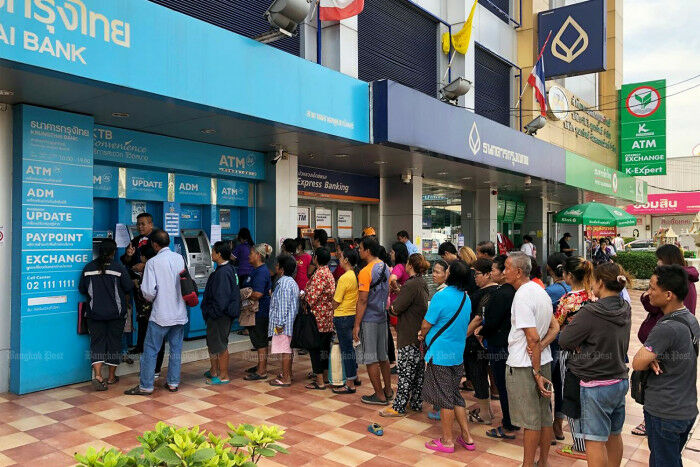Consumer borrowing in Thailand in the red zone
Populist politicians pushing for debt holiday

The effects of consumer borrowing in Thailand during the pandemic is a serious campaign issue, with populist politicians pushing for a multi-year debt holiday.
According to Nikkei, Thais owe more than any other people in the region, reflecting a huge jump in borrowing forced on an economy that relies heavily on tourism.
Thai consumer debt last September stood at 15 trillion baht (US$450 billion), that’s 87% of GDP, up from 70% in early 2020. Between 2019 and 2020, consumer loan delinquencies tripled to more than 1 trillion baht and have stayed above that level ever since.
Surapol Opasatien, chief executive of the National Credit Bureau, told reporters in December…
“Covid turned people with good discipline into ones with severe debt in just two years.”
Government programs have helped but many of these efforts are due to expire. With elections looming, some politicians are calling for repayment delays. A solution to consumer borrowing in Thailand could prove a big vote winner.
The Bhumjaithai Party has proposed a three-year consumer-debt holiday financed by government bonds.
Health minister Anutin Charnvirakul, the party leader and long shot for the next PM, is keen to tell voters how much they would profit from his rule.
Anutin said…
“Covid put us through tough times for three years. So, whoever has lawful debt, Bhumjaithai will give you a debt holiday of up to 1 million baht for three years.”
The Chartthaipattanakla party, led by a former finance minister, has called for replacing the National Credit Bureau’s debtor list with a credit scoring system. The Bank of Thailand and commercial banks oppose the proposal, arguing it would undermine their credibility.
The debt burden on individuals factored into the central bank’s hesitance last year to raise interest rates in line with the US Federal Reserve and neighbouring countries. The bank finally bowed to inflation in August, and the policy rate now stands at 1.5% after four hikes.
Since 2017, the central bank has been working with lenders to restructure consumer borrowing in Thailand of up to 2 million baht. More than 30,000 debtors with a combined 7 billion baht (US$200 million) owing were in the program as of August.
Monitoring consumer debt is tricky for the central bank. The commercial banks it oversees only account for 43% of household loans. The rest are made by other kinds of financial companies, such as savings cooperatives.
Profits at Bangkok Bank, the largest Thai bank by assets, rose 10.6% last year, reflecting strong returns from corporate customers.
By contrast, Thailand’s second-largest bank, Kasikornbank, which funds mainly consumer borrowing in Thailand and smaller businesses, reported a 6% fall in profits in 2022. Provisions for bad loans increased 29% to 52 billion baht (US$15 billion).
Latest Thailand News
Follow The Thaiger on Google News:



























